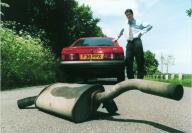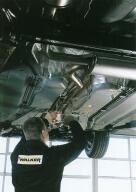Holiday Motoring Misery? - Check Your Car's Exhaust Before Setting Off On Holiday This Summer
As the inevitable traffic queues of summer draw closer, motorists are advised to add an exhaust system and catalytic converter check to their list of tasks before they load up the car and head off on vacation. Otherwise, they run the risk of unwittingly adding to air pollution and incurring higher fuel bills, or even suffering the inconvenience of the car breaking down, says Walker, one of the world's largest brands of automotive exhaust systems and components owned by leading manufacturer Tenneco Automotive. The cause? Damaged or failing catalytic converters and exhausts, which might not be detected until the car is next serviced, to the detriment of the environment, the car's performance, and the owner's bank account.
50% of traffic-related pollution is caused by just 10% of vehicles (source: RAC), yet a simple and inexpensive inspection at a garage or exhaust centre can tell a motorist if their car is one of the culprits. A healthy catalytic converter and properly functioning exhaust can reduce engine noise pollution, help keep the holiday fuel bills down, and reduce emissions, generally making life a lot more pleasant for the car's occupants and passers-by when at a standstill on the roads approaching a popular beauty spot.
 "The most common causes of component failure are corrosion and poor road conditions," says Geoff Wells, sales & marketing director of Tenneco Automotive, and responsible for Walker in the UK. "We're all familiar with the sight of 'blown' exhaust components lying at the side of the road, broken tail pipes hanging precariously underneath a car, and vehicles emitting dense, choking fumes. However, not every exhaust-related problem is as easy to spot."
"The most common causes of component failure are corrosion and poor road conditions," says Geoff Wells, sales & marketing director of Tenneco Automotive, and responsible for Walker in the UK. "We're all familiar with the sight of 'blown' exhaust components lying at the side of the road, broken tail pipes hanging precariously underneath a car, and vehicles emitting dense, choking fumes. However, not every exhaust-related problem is as easy to spot."
When a catalytic converter isn't working as well as it should, harmful waste products are released invisibly into the atmosphere, which can prove seriously damaging to the environment. Symptoms of a failing 'cat' include the infamous, rotten egg smell lingering long after the engine has warmed up, difficulty in starting the car, sluggish acceleration, a loss of power from about 50 mph, and higher petrol consumption
Problems with a catalytic converter can stem from a number of causes. It may have been physically damaged, perhaps by a speed bump or excessively rough terrain. It can be contaminated (usually if leaded fuel is used by mistake), or the monolith - the core of the converter - can literally melt down if it comes into contact with unburned fuel. This can occasionally happen when the car is run on empty, push or tow-started, or has a defect in the ignition or carburetion system. In addition, the lambda sensor, the device which controls the air/fuel mix, may have failed, causing the catalytic converter to operate inefficiently.
Some of these problems can be rectified quickly and inexpensively. Others may mean that the catalytic converter, or even the whole exhaust system, needs to be replaced - not a cheap undertaking - but one that's essential to meet emission legislation requirements. Walker's range, which is readily available from garages and fast-fit centres, includes complete systems and individual components to fit 95% of all car makes, as well as a large range of catalytic converters.
 Once an exhaust system and catalytic converter have a clean bill of health, some simple steps can help keep it that way. To preserve the life of a catalytic converter, Walker recommends you never push or tow-start the car, do not run it 'on empty', and always use unleaded fuel. To prolong the lifespan of an exhaust, short journeys should be avoided as they can result in exhaust gas condensation, which corrodes the metal parts, and vehicles should be serviced regularly.
Once an exhaust system and catalytic converter have a clean bill of health, some simple steps can help keep it that way. To preserve the life of a catalytic converter, Walker recommends you never push or tow-start the car, do not run it 'on empty', and always use unleaded fuel. To prolong the lifespan of an exhaust, short journeys should be avoided as they can result in exhaust gas condensation, which corrodes the metal parts, and vehicles should be serviced regularly.
Emissions under the EU eye Since the widespread introduction of catalytic converters almost a decade ago, vehicle pollution has decreased dramatically. The effectiveness of 'cats', combined with vast improvements in the quality of fuels, means that today it would take 20 new cars to produce the same emissions as just one made thirty years ago. However, the number of vehicles on our roads continues to grow, and 70% of Europeans now cite air pollution as their main environmental concern (source: the European Commission Eurobarometer).
Increasingly stringent EU directives target the problem of air pollution from vehicles, with the latest due to be fully in force by January 2001, and even tougher standards to be in place in 2006. This legislation ensures that motor manufacturers and companies such as Walker, who pioneered the development of catalytic converters back in the 1960s, strive ever harder to find new ways to further reduce vehicle emissions.
 The British Government is currently reviewing a pilot programme in which seven local authorities carried out random roadside emissions checks and issued fixed penalties where cars were found to exceed the legal limits. If this programme is extended to the rest of the country, a failing catalytic converter or other exhaust component could cost a motorist rather more than the price of some extra petrol!
The British Government is currently reviewing a pilot programme in which seven local authorities carried out random roadside emissions checks and issued fixed penalties where cars were found to exceed the legal limits. If this programme is extended to the rest of the country, a failing catalytic converter or other exhaust component could cost a motorist rather more than the price of some extra petrol!
